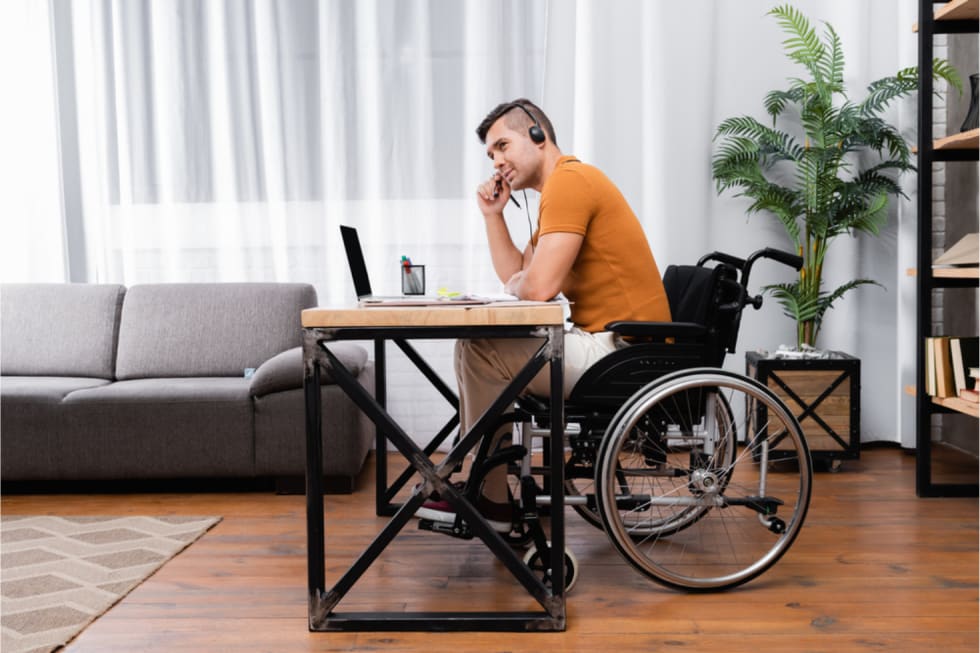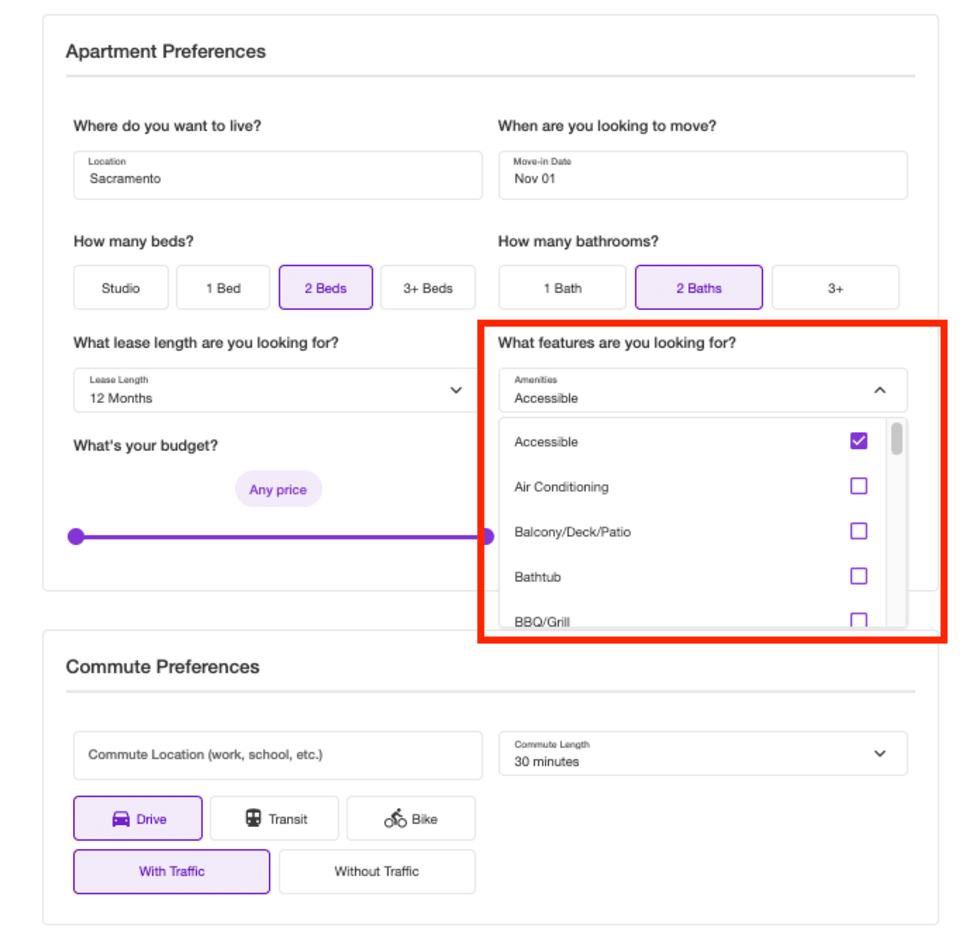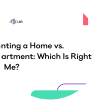How to Find Handicap Accessible Apartments

For most people, apartment hunting is a stressful task. Searching for an apartment in a nice location that offers all the amenities you need can be a struggle. For renters with disabilities, the apartment hunt can become even more difficult. If you are one of these renters, we’ve got you covered. Use these tips to find handicap-accessible apartments that check all of your boxes.
Handicap Accessible Apartment Hunting
Choose the Right City and Neighborhood
Whether you are moving to a small town or a big city, know the ins and outs of the area. Check out the local transportation and commuting options, restaurants and bar scene, and nearby attractions. Take a look at the sidewalks, parks, and public areas to ensure the neighborhood is accessible and will work for you.
Look for Newer Units
With the passage of the Fair Housing Act in 1991, new buildings were required to offer more accessible features. Keeping an eye on newer constructions as they are required to conform to certain regulations, discussed in more detail below.
Understand Your Rights
There are two important federal laws that impact your housing rights, and depending on your state, you may have access to even further protections. The Fair Housing Act required all new multi-family buildings occupied after 1991 to offer accessible features. These features are outlined in the Fair Housing Design Manual, and include things like accessible entrances and common areas, accessible routes to the units, kitchens and bathrooms accessible to wheelchair users, and more. The Fair Housing Act also prohibits discrimination and harassment based on disability.
The Americans with Disabilities Act (1990) ensures that housing providing by state and federal governments is accessible, and that common areas in buildings are as well. This Tenant Resource Center guide, which is based out of Wisconsin, offers further details about the rights outlined in both of these acts.
Finally, you should be aware of any state-level protections that might apply to your living situation. Each state is different, but most will have disability rights for housing outlined on their government websites, such as this page from the Massachusetts Office of Disability.
Requesting Reasonable Accommodations
Reasonable accommodations are changes to your unit that you can ask landlords to make on your behalf. Reasonable accommodation requests are protected under the ADA.
Some examples of reasonable accommodations include
- Installation of grab bars in tubs or showers
- Ability to transfer to a lower-level apartment
- Waiving a guest fee for a live-in home health aid
- Repairing cracks or potholes in sidewalks and driveways that impair access
- Waiving a no-pets policy for a service animal
Bear in mind that reasonable accommodations request don't necessarily mean that your landlord will incur the cost of repairs. In some cases, such as the installation of equipment, you may have to incur the cost. In other cases, the landlord can request that you return the unit to its original condition once your lease has ended.
During apartment tours, you may want to bring any reasonable modification requests (and any proof for such modifications) so you can get that cleared with your potential landlord as soon as possible.

Renting with a Service Animal
Both the ADA and Fair Housing Act protect the rights of tenants with service animals. Waiving a no-pet policy for a service animals is considered a reasonable accommodation, and the FHA states that landlords cannot charge pet fees for service animals. Here are a few other things you should know about service animals:
- Service animals are dogs or miniature horses that are specifically trained to assist with a disability.
- Landlords can't place size or weight limits on service animals.
- You do not need to certify your service animal.
- While your landlord cannot inquire about your disability, they can ask for documentation of a disability-related need for a service animal.
- There may be further state-level protections for you and your service animal.
- Your service animal can be denied if it's a danger to the people or other animals around it, if the handler cannot control it, or if it's not housebroken.
In short, as long as your service animal is highly trained to assist you with a specific need (or needs), you are allowed to rent anywhere with them, and you do not need to limit your search to pet-friendly apartments.
Emotional Support Animals
Emotional Support Animals (ESAs), while they do provide a health benefit to their handlers, are not trained to assist with a specific need, and are therefore not protected under the ADA. However, providing documentation for your ESA from a health professional may help you negotiate with a prospective landlord.
Search for Handicap Accessible Apartments Online
Once you have all your paperwork ready to go, it’s time to find handicap accessible apartments near you! Searching for an apartment online is a great place to start. Most multifamily properties, especially larger communities, advertise online.
The law requires multifamily housing buildings built after 1991 to include certain accessible features. Our site, ApartmentList.com, allows you to filter for accessible apartments across the country.

Once you log in, simply go to your profile and select “Accessible” under amenities. Then you'll be matched with only accessible apartments. Begin to outline where you want to visit, and contact properties for a tour. You can also inquire before visiting if you have any questions about the accessibility features an apartment is offering.
Finding a Wheelchair Accessible Apartment
When you use the "Accessible" filter on Apartment List, you will be shown housing that offers wheelchair accessibility, and possibly other features as well. However, if you are searching elsewhere or investigating a recommendation, then as a wheelchair user, you will want to be mindful of the following:
- The width and condition of doors and entryways.
- Height of light switches, thermostats, and other electrical switches.
- Size of the bathroom and reinforcement within walls to allow for installation of grab bars.
- Weight of the door or length of wait time for card access for electronic doors.
- Availability of accessible parking spaces.
- Height of kitchen counters, stovetops, etc.
Check Nonprofit and Federal Programs
There are many nonprofit and federal programs dedicated to helping people with disabilities find accessible housing. Below are programs that are worth looking into if you want extra help:
- U.S. Department of Housing and Urban Development (HUD): This department offers federal funding for several housing vouchers related to living with a disability. Section 811, Section 8 Housing Vouchers, and Non-Elderly Disabled Vouchers all offer housing vouchers for eligible disabled renters. Per the Fair Housing Act, multifamily housing has accessibility requirements.
- Department of Labor Grants: This department partners with HUD to provide grants to nonprofits and charitable organizations, who in turn provide vouchers for eligible disabled renters.
- Accessible Space: Accessible Space is a nonprofit that works with disabled renters to find accessible housing.
- Habitat for Humanity: Habitat for Humanity is a Christian nonprofit that provides housing for people with disabilities based on their needs.
- Volunteers of America: This nonprofit develops affordable housing across the nation, including for people with disabilities.
- Mercy Housing: Mercy Housing is a nonprofit providing housing for those with special needs across the country.
Book Apartment Tours and Look for Accessible Features
Once you’ve identified the apartments you are interested in, you can now schedule your tours. During apartment tours, be on the lookout for accessible features.
Below is a list of features you'll often see in wheelchair-accessible apartments that you should keep an eye out for:
- Wide doorways and entryways
- Elevators
- Entrance ramps inside and outside
- Accessible sinks and low countertops
- Single lever faucets
- Easy access to appliances with knobs in the front or large font
- Hardwood floors
- Rocker light switches
- Front-loading washer and dryers
- Grab bars
- Handicap parking
- Door handles instead of doorknobs
- Personal alarm systems
- Walk-up apartments (when available)

Gather Your Resources for Apartment Applications
Make sure you have all your documents ready so you can apply for an apartment as early as possible. When you’re organized from the start it makes the entire process go a lot smoother.
If you want to know more about what to expect, we’ve outlined the apartment application process, including what documents you need and what to expect.
Organize Your Proof of Income
As part of the application process, you will need to prove your source of income. We’ve explicitly called out this step, even though it is part of gathering resources because it is so critical to your application. If you are reliant upon an alternate form of income other than a pay stub, such as housing and disability benefits, make sure to get all the proper paperwork in order early.
Remember, a landlord is legally not allowed to discriminate against you based on your disability or your source of income. They can, however, enforce a rent-to-income ratio required to rent an apartment as long as it is consistent for all applicants.
Ask Questions to Your Potential Landlord
During your apartment walkthroughs, ask lots of questions to make sure the apartment can work for you. There are some important, general questions to ask when renting an apartment.
And there will also be more questions related to your personal situation. Don’t be afraid to come with a long list of questions. It’s better to find everything out before signing your lease.
You should also ask the landlord questions related to accessibility and their knowledge of your rights. Some questions you may want to ask include:
- Are there any future renovation plans for the building that’d make it more or less accessible?
- Are you familiar with my right to make reasonable modifications to my space?
- Where are ramps located?
- Are there handicap parking spaces?
- If I required modifications, do you require an additional down payment for returning my unit to its original condition when I move out?
- What is the best way to communicate with you?
- Are common areas in the apartment building ADA-compliant?
Apply and Move
Once you’ve asked all the right questions, found your dream home, submitted your application, and have been approved, it’s time to move! Take time to prepare your moving day, and follow these moving tips to ensure that everything goes smoothly.
Remember that you can use Apartment List to find accessible housing. Take our quiz to get matched today. And don’t forget to celebrate when you’ve found a place that’s perfect for you!
Handicap Accessible Apartments FAQs
What does handicap accessible mean?
Handicap accessibility for apartments is outlined in the Americans with Disabilities Act and the Fair Housing Act. It includes the ability to access and safely use both units and common areas, and it also covers reasonable accommodations for modifications to apartments and for service animals. Examples include wide entryways, elevators, kitchens and bathrooms sized for wheelchair users, reachable light switches, and more.
What is the difference between accessibility and the ADA?
The ADA is a law that protects individuals with disabilities from housing discrimination and outlines certain regulations for federal and state housing as well as public spaces. It also protects reasonable accommodations requests. Accessibility, however, is a broad concept that describes a philosophy for inclusive spaces, and it can extend well beyond ADA requirements.
Share this Article




